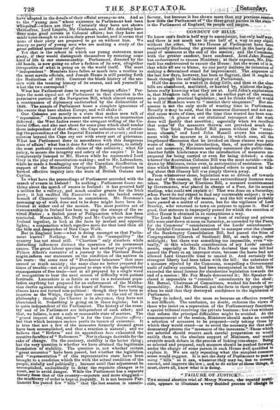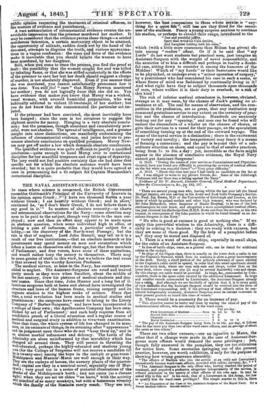"FAILURE OF JUSTICE." - - . -' -- THE second
abortive trial of Mercy Newton, the reputed matn- cide, appears to illustrate a very' decided process of change is public opinion respecting the treatment. of criminal offences, in the matters of evidence and punishment. „ A vast accumulation of circumstantial evidence creates the un- avoidable impression that the prisoner murdered her mother. It may be considered that the evidence proves these things—a settled murderous -intention, a certain mercentiry object to be attained, the opportunity of solitude, sudden death not by the hand of the deceased, attempts to disguise the truth; and curious approxima- tions to a vague confession : the mass and force of the evidence make it inevitable that you should belieVe the woman to have been murdered, by her daughter. Still, when you come to trace the process, you find the proof at fault : the possibility that the woman caught fire and was killed by inhaling flame, or that she was stifled accidentally in the efforts of the prisoner to save her lest her death should suggest a charge of murder, is not absolutely disproved. Even if you assume that she was murdered, you cannot satisfactorily pronounce how it was done. You still feel " sure " that Mercy Newton murdered her mother ; you do not logically know that she did so. You have evidence that makes you know that Mercy was a wicked, venal woman, with avowed homicidal propensities, who was habitually addicted to violent ill-treatnaent of her mother ; but you do not know that she consummated the particular act im- puted.
If the prisoner had been convicted, she must inevitably have been hanged ; since the case is too atrocious to suggest the slightest motive for mercy. Hanging is a very absolute conclm sion ; but the premises, though abundant and cumulatively pow- erful, were not absolute. The spread of intelligence, and a greater insight into nicer distinctions, are manifestly undermining the influence of circumstantial evidence, and juries hesitate to pro- nounce absolute conclusions on qualified premises. Mercy New- ton may get off under a law which demands absolute conclusions. The qualified evidence was quite sufficient to justify a qualified conclusion—quite enough to hand Mercy over to correctional discipline for her manifold trespasses and overt signs of depravity. The jury could not feel,positive certainty that she had done that specific act for which the absolute sentence would have been awarded ; but it is quite probable that they would have agreed at once in pronouncing her a fit subject for Captain Maconochie's correctional discipline.



























 Previous page
Previous page